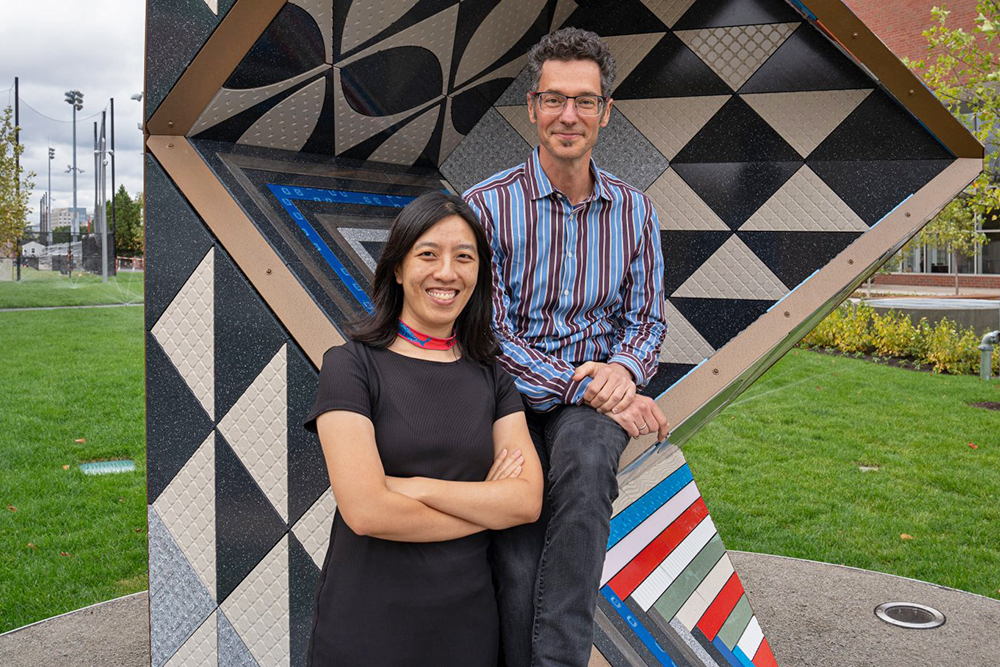
A brand new, multidisciplinary MIT graduate program in music know-how and computation will function college, labs, and curricula from throughout the Institute.
This system is a collaboration between the Music and Theater Arts Part within the Faculty of Humanities, Arts, and Social Sciences (SHASS); Division of Electrical Engineering and Laptop Science (EECS) within the Faculty of Engineering; and the MIT Schwarzman Faculty of Computing.
“The launch of a brand new graduate program in music know-how strikes me as each a essential and a provocative gesture — an vital leap in an period being quickly redefined by exponential development in computation, synthetic intelligence, and human-computer interactions of each conceivable form,” says Jay Scheib, head of the MIT Music and Theater Arts Part and the Class of 1949 Professor.
“Music performs a sublime function on the fore of a outstanding convergence of artwork and know-how,” provides Scheib. “It’s the precise time to launch this program and if not at MIT, then the place?”
MIT’s practitioners outline music know-how as the sector of scientific inquiry the place they research, uncover, and develop new computational approaches to music that embrace music info retrieval; synthetic intelligence; machine studying; generative algorithms; interplay and efficiency techniques; digital instrument design; conceptual and perceptual modeling of music; acoustics; audio sign processing; and software program growth for artistic expression and music purposes.
Eran Egozy, professor of the follow in music know-how and one of many program leads, says MIT’s focus is technical analysis in music know-how that all the time facilities the humanistic and inventive elements of creating music.
“There are such a lot of MIT college students who’re fabulous musicians,” says Egozy. “We’ll method music know-how as laptop scientists, mathematicians, and musicians.”
With the launch of this new program — an providing alongside these obtainable in MIT’s Media Lab and elsewhere — Egozy sees MIT changing into the plain vacation spot for college students fascinated about music and computation research, getting ready high-impact graduates for roles in academia and trade, whereas additionally serving to mould artistic, big-picture thinkers who can deal with massive challenges.
Investigating massive concepts
This system will embody two grasp’s levels and a PhD:
- The Grasp of Science (MS) is a two-semester, thesis-based program obtainable solely to MIT undergraduates. One semester of fellowship is mechanically awarded to all admitted college students. The primary class will enroll in fall 2025.
- The Grasp of Utilized Science (MAS) is a two-semester, coursework-based program obtainable to all college students. One semester of fellowship funding is mechanically awarded to all admitted college students. Purposes for this program will open in fall 2025.
- The PhD program is on the market to all college students, who would apply to MIT’s Faculty of Engineering.
Anna Huang, a brand new MIT assistant professor who holds a shared college place between the MIT Music and Theater Arts Part and the MIT Schwarzman Faculty of Computing, is collaborating with Egozy to develop and launch this system. Huang arrived at MIT this fall after spending eight years with Magenta at Google Mind and DeepMind, spearheading efforts in generative modeling, reinforcement studying, and human-computer interplay to assist human-AI partnerships in music-making.
“As a composer turned AI researcher who focuses on generative music know-how, my long-term aim is to develop AI techniques that may shed new mild on how we perceive, study, and create music, and to study from interactions between musicians as a way to rework how we method human-AI collaboration,” says Huang. “This new program will allow us to additional examine how musical purposes can illuminate issues in understanding neural networks, for instance.”
MIT’s new Edward and Joyce Linde Music Constructing, that includes enhanced music know-how areas, may even assist rework music training with versatile efficiency venues and optimized rehearsal amenities.
A pure residence for music know-how
MIT’s world-class, top-ranked engineering program, mixed with its concentrate on computation and its conservatory-level music training choices, makes the Institute a pure residence for the continued enlargement of music know-how training.
The collaborative nature of the brand new program is the most recent instance of interdisciplinary work taking place throughout the Institute.
“I’m thrilled that the Faculty of Engineering is partnering with the MIT Music and Theater Arts Part on this vital initiative, which represents the convergence of varied engineering areas — corresponding to AI and design — with music,” says Anantha Chandrakasan, dean of the Faculty of Engineering, chief innovation and technique officer, and the Vannevar Bush Professor of EECS. “I can’t wait to see the progressive initiatives the scholars will create and the way they may drive this new subject ahead.”
“Everybody on campus is aware of that MIT is a superb place to do music. However I would like individuals to return to MIT due to what we do in music,” says Agustin Rayo, the Kenan Sahin Dean of SHASS. “This excellent collaboration with the Schwarzman Faculty of Computing and the Faculty of Engineering will make that dream a actuality, by bringing collectively the world’s finest engineers with our extraordinary musicians to create the subsequent era of music applied sciences.”
“The brand new grasp’s program presents college students an unparalleled alternative to discover the intersection of music and know-how,” says Daniel Huttenlocher, dean of the MIT Schwarzman Faculty of Computing and the Henry Ellis Warren Professor of EECS. “It equips them with a deep understanding of this confluence, getting ready them to advance new approaches to computational fashions of music and be on the forefront of an evolving space.”


